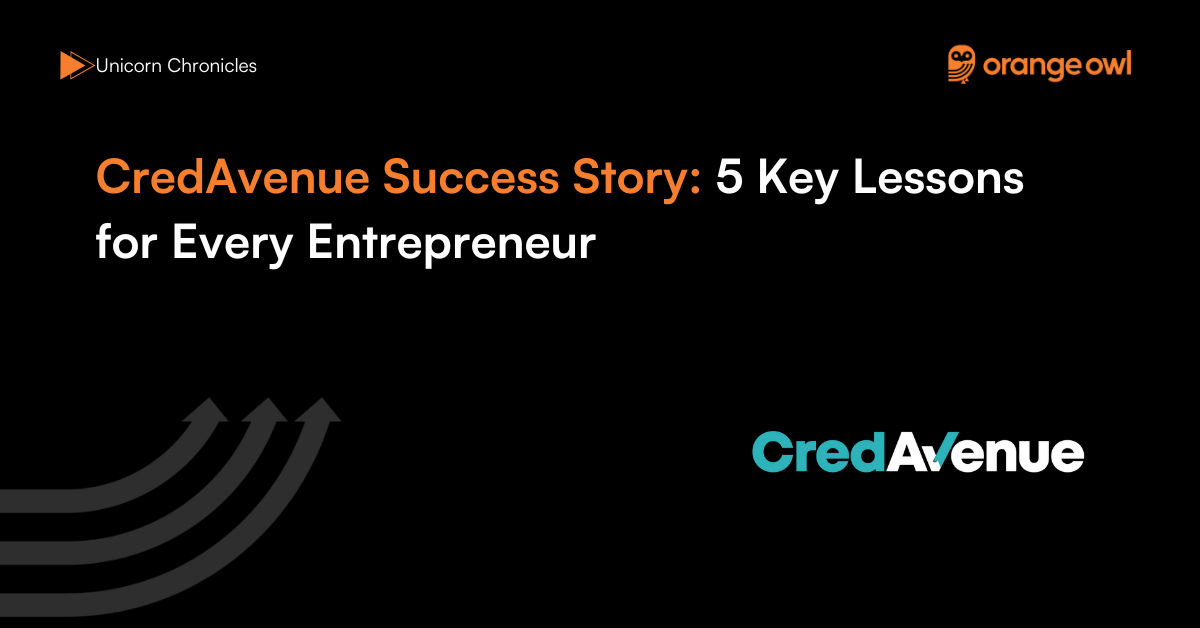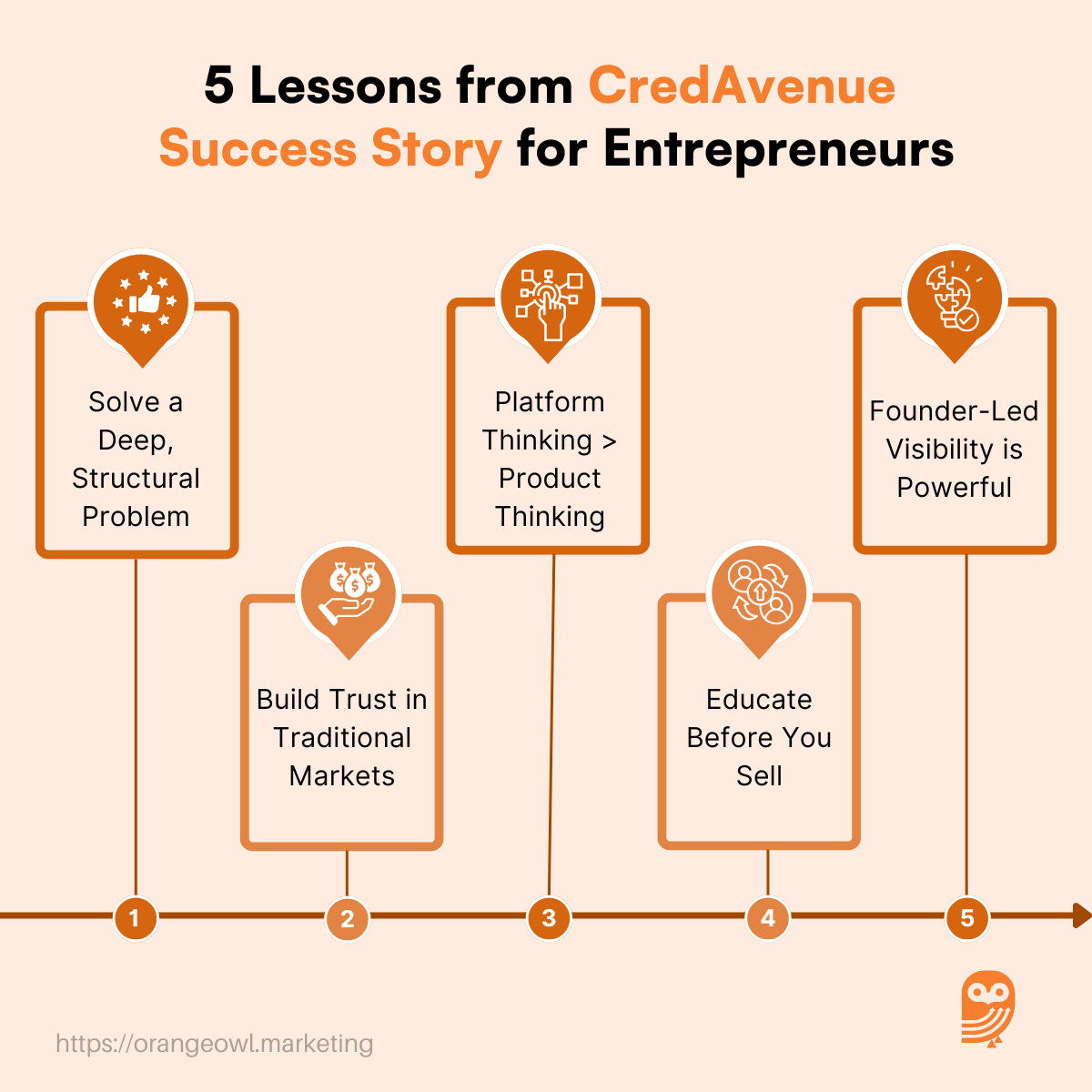CredAvenue Success Story: 5 Key Lessons for Every Entrepreneur
Vivek Goel
May 28, 2025

Table of Contents
Introduction
In the rapidly evolving fintech landscape, CredAvenue—now rebranded as Yubi—has emerged as a trailblazer in India’s credit and debt infrastructure ecosystem. Founded in 2020 by Gaurav Kumar, CredAvenue set out with a bold mission: to unlock the power of credit for Indian businesses by transforming how debt is discovered, executed, and monitored. By building a platform that digitizes the entire debt lifecycle, CredAvenue bridges the massive gap between institutional borrowers and lenders, creating a transparent, scalable, and efficient credit marketplace.
Today, Yubi (formerly CredAvenue) is India’s largest debt marketplace, boasting an impressive ecosystem of over 3,000 corporate borrowers, 750+ lenders, and five tailored platforms serving the entire credit value chain—YubiLoans, YubiInvest, YubiFlow, YubiCo.Lend, and YubiPools.
As of 2023, the company had facilitated over ₹1.5 lakh crore (~$18 billion) in loan disbursals through its platform—a staggering feat for a company just a few years old.
Their growth trajectory has been nothing short of remarkable. In March 2022, CredAvenue became a unicorn after raising $137 million in a Series B funding round, led by Insight Partners, B Capital, and Dragoneer. At the time, it was valued at $1.3 billion, making it one of the fastest Indian fintech startups to reach unicorn status.
But this rise wasn’t without its challenges. From navigating the complexities of India’s fragmented debt market to earning the trust of traditional financial institutions, CredAvenue’s journey is filled with lessons on resilience, innovation, and deep problem-solving.
In a sector where legacy systems and manual processes are the norm, CredAvenue’s tech-first, platform-led approach has been a game-changer—not just for businesses seeking capital, but for the entire financial ecosystem.
Origin Story
CredAvenue was founded in 2020 by Gaurav Kumar, a veteran in the world of structured finance and capital markets. With over a decade of experience in debt financing, including his previous role as Chief Business Officer at Vivriti Capital, Gaurav had deep insights into the systemic inefficiencies plaguing India’s credit ecosystem. During his time at Vivriti, he witnessed firsthand how fragmented, opaque, and offline the debt value chain was—especially for enterprise debt.
“There was no single unified platform for enterprise debt. Everything was fragmented, offline, and inefficient,” Gaurav
Frustrated by the outdated processes and inspired by how technology had transformed other financial sectors like payments (via UPI), Gaurav saw an opportunity to modernize debt infrastructure for India’s growing economy. He envisioned a platform that could bring lenders and borrowers together, eliminate friction, and drive digital transformation across the credit lifecycle—from discovery to disbursal.
With this vision, CredAvenue was born—designed to become the “infrastructure rails for credit in India”, just as UPI had done for payments. The company started with a core philosophy: simplify credit and make institutional debt more accessible, transparent, and scalable through the power of technology.
Business Space and Early Challenges
CredAvenue operates in one of the most complex and under-digitized sectors in Indian finance: the enterprise debt and credit infrastructure space. Unlike consumer credit, enterprise debt involves large-scale funding, intricate documentation, regulatory scrutiny, and multiple stakeholders such as banks, NBFCs, mutual funds, corporate treasuries, and fintechs. The traditional process was relationship-driven, manual, and painfully slow.
CredAvenue set out to digitize and automate the entire debt value chain—including debt discovery, underwriting, due diligence, execution, and post-transaction monitoring. This was an enormous challenge, especially given the conservative nature of institutional lending in India.
“The first 12 months were all about building trust and getting the ecosystem to believe that a tech platform could handle debt at scale,” Gaurav
Educating the market was the toughest part. Most corporate treasurers and institutional lenders were skeptical of using a technology platform for such high-stakes transactions. CredAvenue had to invest significantly in awareness-building, hand-holding clients, and ensuring regulatory compliance to convince stakeholders that a digital-first model could be both secure and efficient.
Another major hurdle was building a platform that could cater to multiple user personas—from a corporate CFO to a mutual fund manager to a fintech credit underwriter. Each came with different needs, compliance requirements, and expectations. Designing a modular, scalable, and regulation-compliant platform that served them all was a multi-dimensional problem.
Despite the challenges, the team remained committed to the vision. The company built a suite of interconnected platforms (later unified under the Yubi brand) tailored to solve specific pain points for different user groups, which eventually helped them gain traction and trust.
Growth Strategies
CredAvenue’s meteoric rise in the fintech space can be attributed to a blend of strategic foresight, modular innovation, and a platform-first approach. From its early days, the company was clear about building infrastructure—not just a product. One of its most notable moves was launching a modular platform architecture, comprising five distinct products—YubiLoans, YubiInvest, YubiFlow, YubiCo.Lend, and YubiPools. Each of these platforms addressed a specific segment of the credit lifecycle, allowing different stakeholders in the ecosystem—from corporates to banks to fintechs—to engage with a tailored solution that met their unique needs.
Unlike many fintech startups that chase scale through retail lending, CredAvenue deliberately chose to focus on institutional debt. This enterprise-first positioning gave the company a differentiated edge, enabling it to handle large-ticket transactions with a level of professionalism, compliance, and structure that retail models often lack. The platform’s ability to facilitate complex, high-value deals in a seamless and transparent manner became a major growth driver.
As CredAvenue scaled, funding played a critical role in accelerating its momentum. In March 2022, the company raised $137 million in a Series B round, led by marquee investors such as Insight Partners, B Capital, and Dragoneer. This funding catapulted the company into the unicorn club with a valuation of $1.3 billion, making it one of the fastest Indian fintechs to reach that milestone. To reflect its broadened vision and commitment to becoming a global debt infrastructure player, the company rebranded itself to Yubi later that year.
“We never looked at it as a lending company. We are a marketplace—a tech-first, infra-led solution,” emphasized Gaurav Kumar, underlining the company’s long-term strategic direction.
Marketing Strategies
Although CredAvenue operated in a highly specialized B2B space, its marketing strategy was anything but conventional. The company recognized early on that building thought leadership was key to earning trust in the financial ecosystem. To that end, CredAvenue regularly hosted webinars, published whitepapers, and shared in-depth research reports on trends, gaps, and opportunities in India’s debt markets. These initiatives not only educated stakeholders but also positioned the company as a domain expert.
A major win in their marketing playbook was how effectively they simplified their complex value proposition. By branding themselves as the “UPI for debt,” CredAvenue was able to cut through the jargon and communicate their role as the infrastructure layer for credit in a way that instantly resonated with stakeholders. This analogy made it easier for the market to understand the transformative potential of their platform.
The personal credibility of Gaurav Kumar also played a pivotal role in brand building. His frequent appearances in podcasts, interviews, and startup events helped build a founder-led narrative that humanized the company and deepened its connection with the financial community. This storytelling approach proved invaluable in a space where trust and credibility are paramount.
The decision to rebrand from CredAvenue to Yubi in 2022 was more than a name change—it was a strategic pivot toward global ambitions. The rebrand was executed seamlessly, with strong messaging across digital channels, partner networks, and media. It signaled to the market that the company was evolving from a domestic marketplace into a comprehensive, borderless credit infrastructure platform.
5 Lessons Every Entrepreneur Should Learn from CredAvenue
1. Solve a Deep, Structural Problem
CredAvenue didn’t jump on a trending fintech wave or try to disrupt a crowded B2C space. Instead, it tackled a complex, deeply-rooted problem in India’s debt infrastructure—an area riddled with inefficiencies, lack of transparency, and fragmentation. Most players avoided this segment because of the regulatory complexity and high entry barriers.
But that’s precisely where the opportunity lay. By choosing to solve a real, systemic challenge, CredAvenue built something not just valuable, but indispensable. Entrepreneurs can take a cue from this approach: look for pain points others ignore, and solve them with persistence and purpose.
2. Build Trust in Traditional Markets
The debt ecosystem is built on relationships and credibility, not just technology. For CredAvenue, the biggest challenge in the early days wasn’t building the platform—it was earning the trust of banks, NBFCs, and large corporates.
These were stakeholders used to decades of manual processes and human negotiations. Overcoming this mindset required more than a sales pitch. It demanded transparency, consistency, and patience.
“Relationships matter in debt markets. We had to be both credible and consistent,” said Gaurav Kumar
This reinforces the idea that technology can enable trust, but it can’t replace it. In industries where legacy systems dominate, trust becomes the real differentiator.

3. Platform Thinking > Product Thinking
CredAvenue didn’t stop at offering a single product or service. From day one, it operated with a platform mindset, building infrastructure that could support various stakeholders in the credit ecosystem.
By launching modular platforms—YubiLoans for term loans, YubiInvest for bond investments, YubiFlow for supply chain finance, and more—the company ensured scalability, flexibility, and stickiness.
This “ecosystem enabler” approach allowed them to serve multiple market needs under one roof, making their offering exponentially more valuable. Entrepreneurs should take note: instead of building isolated tools, think about creating a foundation others can build on.
4. Educate Before You Sell
One of the most underrated aspects of CredAvenue’s success was its focus on education. Rather than hard-selling its platform, the company spent its early months conducting webinars, releasing whitepapers, and educating the market about the inefficiencies in enterprise debt. This strategy helped build awareness, trust, and buy-in from stakeholders who were initially skeptical of digitizing their credit operations.
Especially in complex B2B industries, education precedes adoption. Entrepreneurs need to play the long game—become a trusted educator before positioning themselves as a vendor.
5. Founder-Led Visibility is Powerful
In a space as technical and niche as enterprise debt, credibility often starts with the founder. Gaurav Kumar played an active role in shaping the brand narrative—through interviews, panel discussions, and LinkedIn thought pieces. His background in structured finance gave him authority, and his willingness to represent the brand publicly made CredAvenue relatable.
This visibility wasn’t just about PR—it was about building a human face for a complex business, something many founders underestimate. Whether you’re in B2C or B2B, authentic, consistent storytelling from leadership can be a game-changer.
Conclusion
CredAvenue’s transformation into Yubi, a billion-dollar fintech unicorn, is not just a business success—it’s a blueprint for modern entrepreneurship. The company’s journey proves that tackling unglamorous, behind-the-scenes problems can unlock massive value, if approached with clarity, discipline, and a tech-first vision. From building trust in a relationship-driven industry to launching modular platforms that meet diverse stakeholder needs, CredAvenue has redefined what it means to build infrastructure for a digital economy.
For aspiring entrepreneurs, this story is a reminder that the most meaningful ventures often emerge from solving the hardest problems.
As Gaurav Kumar eloquently puts it:
“Our mission is to make credit flow like water—seamless, accessible, and efficient for everyone.”
That mission is already reshaping India’s credit ecosystem—and it’s only the beginning.


